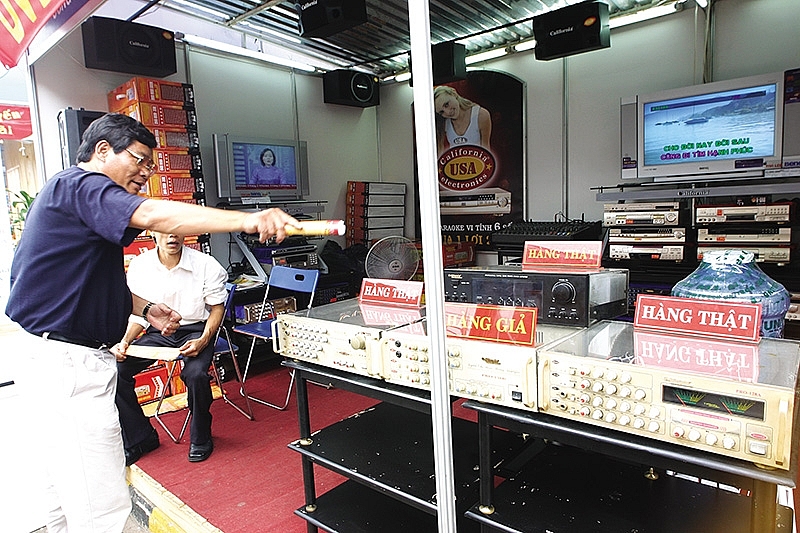Bracing for counterfeit trends and protecting IP ownership
 |
| Despite not having dedicated IP courts yet, Vietnam is continuously combating trademark and intellectual property rights violations (Photo: Le Toan) |
It is undeniable that, in order to have a continuously growing economy that is healthy and robust, protecting intellectual property (IP) and in particular fighting the trademark counterfeiting war, must be achieved to foster a safe environment for brands to operate in.
 |
| Tran Manh Hung, managing partner of Baker McKenzie member firm BMVN |
Anything to the contrary, where IP is unprotected, can pose an alarming threat to brand owners. In other words, dealing with this issue properly will be an attractive selling point to woo further foreign direct investment.
So, how is it currently looking for Vietnam? Progress is continually being made, evidenced by the number of raids on trademark counterfeiters and the country’s various recent attempts at increasing public awareness.
However, there are still many areas for improvement and much work remains to be done for Vietnam to get to where it wants to in combating the arch-enemies of trademark counterfeiting. Although attempts to fight back have been made, the country is still in desperate need of consistent national policy to lead the battle against trademark counterfeiting, and it is arguably time to bring more IP cases to court.
There are ongoing issues due to various factors, including legislative limitations; weak enforcement mechanisms, and customers’ low awareness of the impact of counterfeit goods and unwillingness to move away from them.
The market is awash with cheap, low-quality goods from both local and foreign traders with victims being primarily prestigious brands. This has become one of the main reasons irking foreign investors in the Vietnamese market.
Counterfeiting trends
Vietnam has a long coastline and shares an extended border with China, spanning across several of both countries’ provinces. Additionally, the poor living conditions of residents in these border areas add another complication into the mix.
The combined effect of all these conditions allows the smuggling of goods to flourish at the border.
In the past, counterfeit goods in Vietnam were sourced almost entirely from offshore manufacturers. In the present day, the act of domestic counterfeiting has emerged as a threat that must be reckoned with.
Modern day technological advancement has allowed counterfeits to become so intricate and sophisticated that the task of distinguishing counterfeit goods from genuine goods has now become exponentially harder and almost impossible for the layman without real expertise. Different methods of counterfeiting have been employed to make fakes almost indistinguishable from genuine articles.
Manufacturers have become much more cunning and shrewd, while the advancement in technology means that they are now no longer overlooking the small details when making fakes. They are now focused on producing extremely well-rounded counterfeits, insofar as authenticity stamps and labels are also fabricated to bamboozle even the most vigilant of buyers.
Recommended measures
First, it is recommended that brand owners conduct careful audits of their trademark portfolios in Vietnam. Trademark rights are territorially limited. Vietnam applies the “first to file” principle to its trademarks, meaning that if you have not registered your trademark in Vietnam, but a third party has done so, you will lose your right over the trademark registered by the third party.
Early registration will protect your marks from the filing of similar or identical marks by other parties and infringement.
Regaining ownership over trademarks is a costly and time consuming process that can easily be avoided, so consider filing them before launching a business plan in Vietnam.
Armed with a duly registered trademark, foreign investors should be able to safely circulate their products in the Vietnamese market.
Second, employing border control measures is strongly recommended. Put simply, this process can be used for the detainment of suspected infringing goods. The fact is that having a long border sets a real challenge for customs offices to track down trademark counterfeiters and traders when it comes to filtering out the counterfeits.
As such, brand owners can file customs records with the Vietnam customs offices to supervise and detect products that may be infringing registered trademarks.
In practice, upon receipt of notification from customs offices, brand owners’ representatives will have to work with the authorities to verify the authenticity of the suspected items held at customs.
Last but not least, continued public awareness and educating relevant enforcement authorities remain critical. Once counterfeits have circulated, foreign companies’ only hope will be turning buyers away from buying and consuming them.
It is vital to organise educational campaigns and workshops for enforcement officials and consumers on the subject of identifying genuine goods and the potential detriments of consuming fakes both to their health and the country’s economy, even though this is not new to Vietnam.
Continuous raid campaigns in major local markets are also necessary to fight the sale of counterfeits. Brand owners should also invest in increasing media coverage on the penalties that counterfeit-related offences could carry.
Over many years, brand owners have been tirelessly working with IP lawyers to fight against trademark counterfeiting via traditional administrative measures involving thousands of raids. Unlike other jurisdictions such as Thailand and Malaysia, Vietnam has no IP courts.
Even if Vietnam were to establish an IP court, it is unknown whether there will be enough IP cases to litigate. Generally speaking, court proceedings in Vietnam are time consuming and costly, and most importantly, have not been tested with IP disputes. But this should not be a continued excuse not to have a real IP court for the owners to lean on to settle disputes in future.
In the absence of an IP court, combating trademark counterfeiting in Vietnam will continue to be of utmost importance. In dealing with this, both brand owners and IP lawyers would need to take bold steps to pursue the resolution of IP disputes via the existing court system, and baby steps to tap into international trends and best practice.
What the stars mean:
★ Poor ★ ★ Promising ★★★ Good ★★★★ Very good ★★★★★ Exceptional
Related Contents
Latest News
More News
- State corporations poised to drive 2026 growth (February 03, 2026 | 13:58)
- Why high-tech talent will define Vietnam’s growth (February 02, 2026 | 10:47)
- FMCG resilience amid varying storms (February 02, 2026 | 10:00)
- Customs reforms strengthen business confidence, support trade growth (February 01, 2026 | 08:20)
- Vietnam and US to launch sixth trade negotiation round (January 30, 2026 | 15:19)
- Digital publishing emerges as key growth driver in Vietnam (January 30, 2026 | 10:59)
- EVN signs key contract for Tri An hydropower expansion (January 30, 2026 | 10:57)
- Vietnam to lead trade growth in ASEAN (January 29, 2026 | 15:08)
- Carlsberg Vietnam delivers Lunar New Year support in central region (January 28, 2026 | 17:19)
- TikTok penalised $35,000 in Vietnam for consumer protection violations (January 28, 2026 | 17:15)

 Tag:
Tag:




















 Mobile Version
Mobile Version